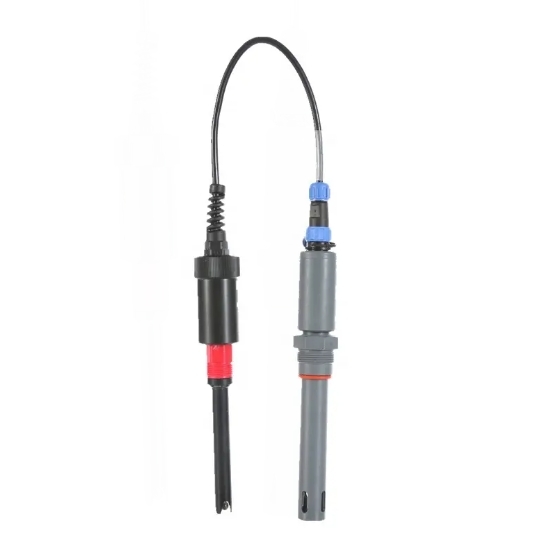The chlorine sensor is a crucial tool for ensuring water safety, playing an important role in a variety of industrial applications. One leading manufacturer of these sensors is Shanghai Boqu Instrument Co., Ltd., which offers wholesale solutions that are at the forefront of sustainable practices. These sensors not only contribute to environmental safety but also align with the growing global emphasis on eco-friendly practices.
1.1 Chlorine Sensors and Environmental Safety
Chlorine, commonly used for water disinfection in municipal water treatment plants, can pose risks if not carefully monitored. Wholesale chlorine sensors from Shanghai Boqu Instrument Co., Ltd. provide an efficient and reliable solution to this challenge. These sensors enable real-time monitoring of chlorine levels, ensuring that they remain within safe limits. By preventing the overuse of chlorine, these sensors contribute to environmental conservation by minimizing the release of harmful by-products into water bodies.
1.2 Shanghai Boqu Instrument Co., Ltd.: Pioneering Sustainable Technologies
Shanghai Boqu Instrument Co., Ltd. stands out as a pioneer in manufacturing chlorine sensors that adhere to sustainable principles. Their commitment to developing cutting-edge technologies reflects in the design and functionality of their sensors. The company’s dedication to sustainability extends beyond the products themselves, encompassing the entire manufacturing process. Through strategic partnerships and research initiatives, Shanghai Boqu Instrument Co., Ltd. aims to continually improve the environmental impact of their products.
Strategic Bulk Buys: Wholesale Chlorine Sensors for Municipal Water Treatment Plants
Municipal water treatment plants are vital components of urban infrastructure, providing safe and clean drinking water to communities. Effective water disinfection is a paramount concern in these facilities, and wholesale chlorine sensors become crucial instruments in maintaining the quality of water supplies.
2.1 Ensuring Water Quality with Bulk Chlorine Sensor Purchases
Investing in wholesale chlorine sensors from Shanghai Boqu Instrument Co., Ltd. proves to be a strategic move for municipal water treatment plants. Bulk purchases not only offer cost savings but also ensure that every critical point in the water treatment process is equipped with reliable sensors. This strategic approach minimizes the risk of undetected chlorine leaks or fluctuations, safeguarding the quality of water delivered to households.
2.2 Remote Monitoring for Enhanced Efficiency
Shanghai Boqu Instrument Co., Ltd.’s chlorine sensors go beyond conventional monitoring by offering remote sensing capabilities. This feature allows water treatment plant operators to monitor chlorine levels in real time from a centralized location. The ability to remotely track and control chlorine levels enhances operational efficiency, enabling prompt responses to any deviations from the desired parameters.
Harvesting Health: Wholesale Chlorine Sensors in Agricultural Industries
While chlorine is a vital component in water treatment, its presence in agricultural processes is equally significant. Shanghai Boqu Instrument Co., Ltd.’s wholesale chlorine sensors find applications in agricultural industries, contributing to the health and productivity of crops.
3.1 Precision Agriculture with Chlorine Sensors
In agricultural irrigation systems, maintaining the right chlorine levels is essential for preventing the growth of harmful microorganisms. Wholesale chlorine sensors from Shanghai Boqu Instrument Co., Ltd. empower farmers with precise monitoring capabilities. This ensures that the water used for irrigation is free from contaminants, promoting the health of crops and reducing the risk of waterborne diseases.
3.2 Environmental Impact and Crop Health
By utilizing chlorine sensors, agricultural industries can not only optimize water quality but also minimize the environmental impact of agricultural practices. Proper monitoring prevents the excessive use of chlorine, reducing the potential runoff of harmful substances into surrounding ecosystems. This dual benefit underscores the importance of integrating advanced sensor technologies into modern agricultural operations.
Introducing the BH-485-CL: A Technological Marvel
The BH-485-CL is an IoT digital residual chlorine sensor designed for diverse applications, including drinking water treatment, swimming pools, spas, and fountains. Operated through the Modbus RTU RS485 protocol, it boasts a rated voltage principle and an impressive lifespan of two years. Shanghai Boqu Instrument Co., Ltd. takes pride in presenting a sensor that not only simplifies maintenance but also enhances performance across various water quality monitoring scenarios.
Key Features that Redefine Water Quality Monitoring
This digital residual chlorine sensor leverages advanced non-membrane constant voltage residual chlorine technology, eliminating the need for diaphragm and medication changes. The stability of its performance, high sensitivity, and rapid response make it a standout choice for water quality professionals. Its multi-functionality and accurate measurement capabilities contribute to its versatility in applications ranging from self-controlled dosing of circulating water to chlorine management in swimming pools.
Technical Features: A Closer Look Under the Hood
6.1 Electrical Safety Assurance
The BH-485-CL employs an isolation design for power and output to ensure electrical safety. With a built-in protection circuit for power supply and communication chips, the sensor is equipped to handle various operating conditions. This comprehensive protection circuit design allows the sensor to work reliably without the need for additional isolation equipment.
6.2 Intelligent Communication Protocol
Featuring RS485 MODBUS-RTU two-way communication, the sensor can receive remote instructions, making it an ideal choice for scenarios where real-time monitoring and control are crucial. The simplicity and practicality of its communication protocol enhance user convenience, making it a preferred solution for professionals across different industries.
6.3 Enhanced Diagnostics and Memory Integration
The BH-485-CL stands out with its output of more electrode diagnostic information, showcasing its intelligence in water quality assessment. The integrated memory functionality stores calibration and setting information even after a power outage, ensuring continuity in monitoring and reducing the need for repeated calibration.
Technical Parameters: Precision in Measurement
7.1 Accurate Chlorine Measurement
The BH-485-CL excels in measuring residual chlorine values within the range of 0.00 to 20.00mg/L, with a remarkable resolution of 0.01mg/L. Its accuracy, at 1% F.S., ensures precise monitoring of chlorine levels, a critical factor in various water treatment applications.
7.2 Temperature Compensation and Robust Construction
With a temperature compensation range from -10.0 to 110.0 ℃, the sensor adapts to varying environmental conditions. Its construction, featuring SS316 housing and a platinum sensor using the three-electrode method, ensures durability and reliability. The PG13.5 thread simplifies on-site installation, making it an accessible choice for professionals in the field.
Conclusion
As the world places an increasing emphasis on sustainability, the role of chlorine sensors in safeguarding water quality and environmental health becomes more pronounced. Shanghai Boqu Instrument Co., Ltd. stands as a reliable partner in this endeavor, offering wholesale chlorine sensors that align with the principles of environmental responsibility. Whether deployed in municipal water treatment plants or integrated into agricultural irrigation systems, these sensors play a pivotal role in fostering a healthier and more sustainable future.
Post time: Dec-05-2023





